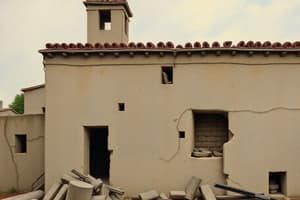Podcast
Questions and Answers
What type of material is Portland cement primarily made from?
What type of material is Portland cement primarily made from?
- Water and lime
- Calcareous material and alumina (correct)
- Clay and gypsum
- Sand and gravel
Which type of cement is capable of setting and hardening under water?
Which type of cement is capable of setting and hardening under water?
- Expansive cement
- Non-hydraulic cement
- Hydraulic cement (correct)
- Air-entraining cement
Who is credited with the invention of Portland cement?
Who is credited with the invention of Portland cement?
- Thomas Telford
- Joseph Aspdin (correct)
- Isambard Kingdom Brunel
- John Smeaton
What was the original use of cement before it was extended for making concrete?
What was the original use of cement before it was extended for making concrete?
When was the first British standard specification for Portland cement drawn up?
When was the first British standard specification for Portland cement drawn up?
What is the term for the heat released during the reaction of cement with water?
What is the term for the heat released during the reaction of cement with water?
Which product of hydration constitutes 50-60 percent of the volume of solids in a completely hydrated cement paste?
Which product of hydration constitutes 50-60 percent of the volume of solids in a completely hydrated cement paste?
Which compound hydrates comparatively slowly and contributes to the later strength of concrete?
Which compound hydrates comparatively slowly and contributes to the later strength of concrete?
What percentage of the volume of solids in the hydrated paste does calcium hydroxide constitute?
What percentage of the volume of solids in the hydrated paste does calcium hydroxide constitute?
What is an undesirable effect of the presence of calcium hydroxide in concrete?
What is an undesirable effect of the presence of calcium hydroxide in concrete?
In which situation is a higher percentage of C2S preferable in cement?
In which situation is a higher percentage of C2S preferable in cement?
What is the nature of the hydration process over time?
What is the nature of the hydration process over time?
What role does water play in the hydration of C3S and C2S compounds?
What role does water play in the hydration of C3S and C2S compounds?
What happens if less than 38% of water is used in the cement mix?
What happens if less than 38% of water is used in the cement mix?
What is the nominal diameter of gel pores as mentioned?
What is the nominal diameter of gel pores as mentioned?
How is setting different from hardening in cement paste?
How is setting different from hardening in cement paste?
What causes a flash set in cement?
What causes a flash set in cement?
What percentage of gel water by weight is required for the formation of gel?
What percentage of gel water by weight is required for the formation of gel?
What happens if excess water is added to the cement mix?
What happens if excess water is added to the cement mix?
What is the initial setting time?
What is the initial setting time?
What type of pores are marked as 'C' in the simplified model of paste structure?
What type of pores are marked as 'C' in the simplified model of paste structure?
What is the role of calcium hydroxide in concrete?
What is the role of calcium hydroxide in concrete?
What is the transition zone in concrete?
What is the transition zone in concrete?
What percentage of the hydrated paste consists of hydrates of various compounds after a month?
What percentage of the hydrated paste consists of hydrates of various compounds after a month?
What causes the transition zone to develop microcracks?
What causes the transition zone to develop microcracks?
What is the main reason concrete fails at lower stress levels than expected?
What is the main reason concrete fails at lower stress levels than expected?
What happens to the unhydrated cement particles as time passes?
What happens to the unhydrated cement particles as time passes?
What is the primary composition of fresh cement paste shortly after mixing?
What is the primary composition of fresh cement paste shortly after mixing?
What type of reaction is responsible for consuming some of the mixing water?
What type of reaction is responsible for consuming some of the mixing water?
What is considered a disadvantage of calcium hydroxide in concrete?
What is considered a disadvantage of calcium hydroxide in concrete?
Flashcards
What is Cement?
What is Cement?
A material that binds mineral fragments together, forming a solid mass. It has adhesive and cohesive properties.
Hydraulic Cement
Hydraulic Cement
The process of cement hardening due to chemical reactions with water. This happens even underwater, making it ideal for construction.
Who invented Portland cement?
Who invented Portland cement?
The invention of Portland cement is attributed to Joseph Aspdin. He patented this cement in 1824, named after the resemblance of the hardened product to Portland stone.
Early Portland Cement
Early Portland Cement
Signup and view all the flashcards
Cement Standards Development
Cement Standards Development
Signup and view all the flashcards
Heat of Hydration
Heat of Hydration
Signup and view all the flashcards
Cement Hydration
Cement Hydration
Signup and view all the flashcards
Rate of Hydration
Rate of Hydration
Signup and view all the flashcards
Calcium Silicate Hydrate (C-S-H)
Calcium Silicate Hydrate (C-S-H)
Signup and view all the flashcards
Calcium Hydroxide (Ca(OH)2)
Calcium Hydroxide (Ca(OH)2)
Signup and view all the flashcards
Tricalcium Silicate (C3S)
Tricalcium Silicate (C3S)
Signup and view all the flashcards
Dicalcium Silicate (C2S)
Dicalcium Silicate (C2S)
Signup and view all the flashcards
Transition Zone
Transition Zone
Signup and view all the flashcards
Microcracks
Microcracks
Signup and view all the flashcards
Crack Propagation
Crack Propagation
Signup and view all the flashcards
Bond Strength
Bond Strength
Signup and view all the flashcards
Calcium Sulfate Formation
Calcium Sulfate Formation
Signup and view all the flashcards
Corrosion Resistance
Corrosion Resistance
Signup and view all the flashcards
Fresh Cement Paste
Fresh Cement Paste
Signup and view all the flashcards
Capillary Pores
Capillary Pores
Signup and view all the flashcards
Setting Time
Setting Time
Signup and view all the flashcards
Hardening Time
Hardening Time
Signup and view all the flashcards
Initial Setting Time
Initial Setting Time
Signup and view all the flashcards
Final Setting Time
Final Setting Time
Signup and view all the flashcards
Flash Set
Flash Set
Signup and view all the flashcards
Gel Pores
Gel Pores
Signup and view all the flashcards
Hydration
Hydration
Signup and view all the flashcards
Water Requirements for Hydration
Water Requirements for Hydration
Signup and view all the flashcards
Study Notes
What is Cement?
- Cement is a material with adhesive and cohesive properties, bonding mineral fragments into a whole.
- Portland cement is primarily made from calcareous materials (e.g., limestone, chalk) and alumina and silica (e.g., clay, shale).
- Hydraulic cements set and harden under water through chemical reactions.
Historical Background
- Cementing materials were used in ancient civilizations (Egyptians, Romans, Indians).
- Joseph Aspdin, a Leeds builder, patented Portland cement in 1824.
- The name "Portland" comes from its resemblance to a natural stone found in Portland, England.
- Aspdin's process involved mixing, grinding, and calcining (heating) limestone and clay.
- Cement was initially only used in mortar; later use expanded to include concrete.
Manufacture of Portland Cement
- Raw materials: Limestone/chalk and shale/clay.
- Processes: Raw material grinding, mixing in specific proportions, burning at high temperatures (1300-1500°C) to form clinker, cooling, and grinding to a fine powder. Gypsum is added.
- Two processes : Wet and Dry
- Wet process: Raw materials are mixed in water before feeding into the kiln.
- Dry process: Raw materials are mixed dry before feeding into the kiln.
Chemical Composition of Portland Cement
- Portland cement is primarily composed of oxides of Calcium, Silicon, Aluminium and Iron.
- The relative proportions of these oxides affect cement properties.
- Major compounds (Bogue compounds): Tricalcium silicate (C3S), Dicalcium silicate (C2S), Tricalcium aluminate (C3A), and Tetracalcium aluminoferrite (C4AF).
Hydration of Cement
- Hydration: Chemical reaction between cement and water.
- Hydration products (e.g., calcium silicate hydrate, calcium hydroxide) give cement its strength and properties.
- Hydration is a gradual process.
- Early hydration is quicker; later hydration is slower.
- Heat of Hydration; The heat of hydration is related to the rate of hydration of different compounds.
- Calcium silicate hydrates are the most important hydration products.
- Calcium hydroxide is also a major product involved in the setting reaction.
Setting and Hardening of Cement
- Setting: A change from a fluid to a solid state.
- Initial setting time: When the paste starts losing plasticity.
- Final setting time: When the paste completely loses plasticity.
- Hardening: Continued strength development after setting.
Fineness of Cement
- Fineness is crucial to hydration rate and strength development.
- Finer cements have more surface area for hydration.
Soundness of Cement
- Cement must not undergo significant volume changes after hardening.
- Unsoundness can cause cracking.
Types of Portland Cement
- Different types cater to various applications (e.g., ordinary, rapid hardening, low heat, sulfate resisting).
- Variations relate to chemical composition and heat of hydration.
- Some types are designed for specific environmental conditions.
Testing of Cement
- Field tests help assess cement quality.
- Laboratory tests provide detailed data.
Studying That Suits You
Use AI to generate personalized quizzes and flashcards to suit your learning preferences.




